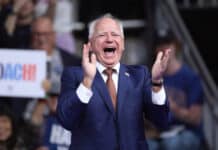MINNEAPOLIS – Target’s stock price is now hovering around the $54 mark, and the retail giant let go of another senior executive as the company seeks to regain its profitability.
Casey Carl, Target’s chief innovation officer, will leave the company after 20 years, reports Fortune Magazine. The company has experienced three straight quarters of sales declines, and said in February that it does not expect 2017 to be any better. Target announced Carl’s imminent departure in an email to corporate headquarters employees on Thursday.
Carl was the chief architect behind two major projects the company canceled in February. This included the “Store of the Future” where robots would retrieve products from a warehouse, and have them ready at checkout at the smaller storefront.
That project was cancelled after Target’s stock price fell to $63.42 in early February, then the lowest price for Target’s stock since October 2014. This was down from an all-time high of $83.98 on April 19, 2016, the day the company announced its transgender bathroom policy.
Since then the stock price continued to fall. On April 5, the price closed at $52.75, the lowest it has closed at since April 21, 2012. It had recovered slightly by April 21, 2017, closing at $54.78.
Carl will be leaving the company May 5, according to the Star Tribune. He is the most senior of several executives focused on digital or innovation ventures who have left Target in recent months. Target’s CEO Brian Cornell said in March that the company can no longer afford to work on innovation projects that do not pay off within three to four years.
The total stock price drop hit investors for over $15 billion, reported Breitbart in February. That will have only increased in the past two months as the price fell another nine dollars a share.
All of this came after the transgender policy was introduced. Cornell has since claimed he was left out on the decision making process regarding the company’s public announcement of the change in policy, reports The Daily Caller. Instead Target’s “risk committee” circulated the idea of publicizing the policy change to other executives. Target’s chief risk officer, Jackie Rice, and the company’s chief external-engagement officer, Laysha Ward, gave the go ahead without Cornell’s involvement.












